Free speech still in the news
The Higher Education Policy Institute has published a report on free speech on campus – Cracking the code: A practical guide for university free speech policies. This is the last report to be written for HEPI by Dr Diana Beech before she goes to work for Sam Gyimah as policy adviser. [Those readers who met Diana when she attended our recent policy meeting or read my blog about the event will know that this is a good thing – Diana is well informed and positive about the sector and open minded rather than partisan –we’re looking forward to seeing her impact.]
HEPI say about the report:
The report finds some worrying loopholes in existing codes of practice, including:
- overlooking new types of meetings afforded by social media and digital technologies;
- failing to publish updated policies following internal reviews;
- neglecting to provide codes in a wide range of accessible formats such as braille or audio;
- not hosting codes in the public domain; and
- not linking to necessary supplementary materials such as room booking forms and risk assessment protocols.
This new guide is intended to assist university boards and committees when formulating or updating codes of practice on freedom of speech to ensure policies are as efficient and user-friendly as possible.
The foreword is written by Peter Tatchell, human rights campaigner, who says:
- “Overall, I find most universities positive, conducive places for healthy debate. When you compare the lively conversations that take place on UK campuses to those that are openly or more subtly squeezed out, or plain banned, in other countries, our universities look like bastions of free speech. And yet … Not everything is perfect. A minority of students do seem remarkably intolerant and unwilling to hear others’ views. It’s not even a left / right split. Sometimes the fiercest disagreements come between people who all regard themselves as progressive. Challenging student meetings can get bogged down in red tape about the rules of debate and their interpretation. It is also sometimes contested who can speak, what they can say and the degree of dissent that is permitted.”
- And “In my view, bad ideas are most soundly defeated by good ideas. Bigoted opinions should never be given a free pass. They should always be protested and countered. But the best way to do this is usually by subjecting them to open debate, to show why they are factually and morally wrong.”
The recommendations are lengthy, but then this is a complicated area:
- “To optimise the format of codes of practice on freedom of speech, we recommend universities:
- include a cover page to the code detailing the document’s history, including key information on the date of its approval, the next date of review and contact information for the responsible officer;
- consider formulating the codes in other formats (such as braille or audio) to ensure the widest possible readership;
- enhance the usability of the codes by employing hyperlinks throughout all online versions of the policies, as well as writing out web addresses in full in an appendix to the code (or in footnotes or endnotes) to ensure this information is not lost when the codes are printed out;
- make use of additional appendices to the codes to host vital supplementary documentation including application forms and additional guidance, so that this information is all housed in one place;
- visualise application and assessment processes in the form of process flowcharts wherever possible, to allow event organisers to easily understand what is required of them and to ensure the policies are as simple as they can be during the design process;
- take care to define what the code covers both in terms of meeting size and meeting format; and
- outline the precise remits of the code if intended, for example, to be applicable to students’ unions, in other countries, in constituent parts of a university with otherwise autonomous governance structures (such as Oxbridge colleges) or in faith-based institutions, where contradictions may occur with religious doctrine (such as Canon Law in Catholic institutions).
- To optimise the processes surrounding the codes of practice on freedom of speech, we recommend universities:
- regularly review and update their code, particularly in line with developments in relevant legislation;
- ensure the latest versions of the code are swiftly approved by relevant university boards and committees, and published accordingly on university websites;
- keep a visual record of where the code has been disseminated to allow university committees and boards to decide whether this is appropriate and sufficient at the next review meeting;
- avoid requesting information from speakers or event organisers that could be deemed unreasonable or offputting (such as routinely requesting copies of speeches before they are made);
- include in the code reasonable timescales for both the initial application to host an event or external speaker and the appeals process;
- offer in the code assistance to event organisers – such as PA systems or added security provisions – to give an event the best chance of going ahead before considering it for cancellation;
- consider including a disclaimer in the code to cover more lengthy and complex decision processes over appeals (although every effort should be made to stick to the original timescales outlined as above); and
- consider employing the expertise of an assessment panel, as opposed to just one accountable officer, to help in the case of deciding whether more complex or controversial events or speakers should go ahead.
- In addition, higher education institutions – particularly in England – may consider producing additional governance documents, such as statements of commitment to the codes of practice. This will not only help institutions to become clear about what their codes of practice are for, and what purpose they serve, but also help them to prepare for life under the Office for Students and its new Regulatory Framework, which may well require providers of higher education to justify their policies and processes in more detail in the future.”
Sir Michael Barber was on the Today programme on Thursday – he refused to say that stopping organisers requesting speech in advance was going to be OfS policy (the OfS is not a bureaucratic organisation or a rule maker, but a regulator, he said – we aren’t sure about this distinction without a difference either) – but he did say it was a good idea.
Smita Jamdar of Shakespeare Martineau tweeted a response thread which is worth reading:
- “So the JCHR may have said universities should not ask for details of what will be said, but as long as that guidance remains in that form I do not think it is fair to ask universities to carry the risk. Government needs to work out what it wants and make some policy changes.”
Student Loans, RPI & HE Funding
The cost of student loans and how it is presented in public accounting is an issue that has been bubbling for a while. Both the Commons Economic Affairs Committee and the Treasury Committee reviewed the treatment of student loans in the public accounts during 2018. The timing is fascinating in the context of the Government’s current review of post-18 education – often described as the fees and funding review, but as we know, it is not only this. We wrote about this in our policy update on 6th July. Andrew McGettigan, who spoke at the recent Wonkhe conference eon this, has now published a blog on Wonkhe setting out his argument in full – this is well worth reading.
The debate has now moved on as this week two bodies proposed alternative methods of accounting for student loans, one from the Office for Budget Responsibility (OBR) and the other from the Office for National Statistics.
The Times explain the financial trickery:
- Currently student loans are treated as a normal loan for the purpose of the public finances, which means that the cash transfer does not show up as borrowing but as an asset. Interest payments owed, but not necessarily paid, by former students show up as receipts and reduce the deficit. The effect is to improve the deficit in the early years as interest is capitalised. When students fail to meet repayments and loans are written off 30 years later, the loss is incurred as spending.
It is only at the point of writing off the loans that they count as expenditure and negatively affect public spending statistics. If the government sells off the loans before the write-off is due, that moment of reckoning will never arrive and the government will never, so far as the public accounts are concerned, have had to demonstrate direct public expenditure on student finance. Its benefit is that it provides sustainable funding for HE. Arguably therefore, HE does not have to fight with other departments to secure an adequate share of public funds.
OBR’s chairman Robert Chote speaks of the system saying it:
- “flatters the impact of student loans on the public finances and creates a perverse incentive to sell them, even at a loss…. Capturing the impact of student loans in measures of the public sector deficit and debt is not straightforward, because the full impact of any particular cohort of loans takes more than three decades to fully work through…”
The OBR estimates that the government’s plan to sell £12bn worth of older student loans by 2020-21 “will deprive it of £23bn of future repayments”.
This article on Research Professional provides more detail on alternatives to the current treatment. It goes on to note that the HE Review has been instructed to make recommendations that do not worsen the spending deficit. Research Professional explain that:
- “changing the way student loan repayments are presented in the public finances would automatically add to the deficit and would not only hamper Augar’s review but also make it next to impossible for chancellor Philip Hammond to meet his own spending targets. This is before you factor in the money—as yet unaccounted for—promised to the NHS and all the other demands that will be made by Brexit.
- A degree of collusion is evident between the two reports, with the OBR’s working paper citing the one from the ONS. In short, both put up a range of different accounting models and invite us to pick one, with a strong steer that we should go for a hybrid model that would classify the estimated part of the loan that will be repaid as a loan, and the estimated part that will not be repaid as a grant or direct upfront expenditure.
- The effect of each of the accounting models is significant, with the hybrid model immediately adding 0.7 per cent to the public spending deficit. All the models considered present the public finances in a less favourable light than the existing system, with a commercial model of revenue and expenditure for loan repayment, as you might find in the banking industry, adding 1.1 per cent to the deficit by the mid-2040s.”
This presents a challenge for the HE Review as it is expected to work within public spending constraints. Research Professional note that any short-term change would almost certainly mean higher education having a negative impact on the public accounts. This could put universities in line for budget cuts.
Retail Price Index
The use of the Retail Price Index (RPI) to calculate the interest owed on students loans is another challenge. RPI has been denounced as an inappropriate statistic that inflates the amount students are required to pay back. The Economic Affairs Committee has investigated the use of RPI and considered its possible reform. The Committee session spanned several topics, including a focus on its use within HE. John Pullinger (Chief Executive of the UK Statistics Authority) said he did not wish to unilaterally change the RPI as it would result in some parties getting windfall gains and others losses. However, he felt the reform of RPI would definitely happen at some point in the next ten years. He stressed the need for the change to be ‘choreographed‘ with changes by the Treasury and the Bank of England (BoE). It was put to him that it was the role of the Office for National Statistics (ONS) to come forward with an alternative proposal (to move away from RPI) for the chancellor for due consideration.
On the use of RPI within student loan accounting Lord Burns highlighted that ONS felt the economic nature of student loans closely matched the definition of a loan in national accounts. Whereas consideration could be given to the proportion of loans not expected to be repaid. John responded within the historical context noting that when student loans first came about they were considered by the national accounts team to be loans, which was how they had appeared in the national accounts since. He said the response to the committee on this issue during the loans enquiry could have been more ‘nuanced’, but this is essentially what happened.
John Pullinger went on to note if student loans will be sold, maybe they should not have been considered as loans at all. Since April the ONS had been considering how they should be treated, which had resulted in five new options. (Watch the Committee session for more detail on this.) He went on to state the ONS had now ‘opened the box’ and was looking at the issue carefully, he mentioned a decision would be made by December.
He was also asked to comment on the suspicions that the reforms to student finances had constituted a ‘fiscal illusion‘ (see the two reports out this week mentioned above) to reduce the deficit. He confirmed he was observing recent developments with regard to this point.
HE Funding
The House of Commons library regularly produces succinct briefing papers on topics to inform MPs. They have just released one on HE funding (England) which sits alongside more specific papers on student loan statistics, HE finance and the value of student maintenance support (all papers can be accessed here). The HE Funding paper itself covers all the main points in a simple way to draw together the myriad of HE funding changes in the last 6 years. Despite the Brexit furore Parliament is actually winding down towards recess. (Recess being the time when MPs return to catch up on their constituency work and take some time off.) With the release of the HE Funding briefing paper as summer reading just before recess one wonders what is in store for HE when Parliament reconvenes in September.
Cost Effective Universities – Student Spending
New analysis from Which? University reveals how choosing where to study can have huge consequences on the cost of living for students – with a potential disparity of £15,000 over the term of a typical degree between the cheapest and most expensive UK regions. Using data on student expenditure and the average cost of rent, Which? University ranked 12 regions across the UK to reveal the most expensive and cheapest areas for students to live.
Unsurprisingly London was the most expensive region (£14,200 average student living cost per year). Second were the South East and the East of England (both £11,000 per year). Northern Ireland was the cheapest (£8,800), followed by Wales (£9,500). The South West region is mid-table for cost. The student budget calculator on the Which? website shows BU coming in very reasonably at £10,824 per annum (Arts University Bournemouth comes in at £12,120 per year).
The rest of the analysis highlights familiar student finance themes:
- 31% per cent of students said that money worries have negatively impacted their mental health/stress
- 20% use their overdrafts to manage the cost of living at university, (10% rely on credit cards)
- 46% rely on their parents to bankroll their living costs (remember there is an expectation that parents contribute anyway for students from certain household income bands)
- 40% of students found the cost of university was higher than expected
- 13% of students considered not continuing their studies due to financial difficulties
Which? use the analysis to advertise their student budget calculator tool which calculates average monthly expenditure, including a breakdown of rent, utilities and transport costs per university selected. It also factors in regional variables to improve accuracy in its predictions. With Clearing fast approaching Which? are keen to ensure students who are forced to change their HE plans have access to fast information on their potential new institutions.
There is an interesting section showing student spending habits.
| Category |
Percentage of students that spent on the category |
| Water & Energy |
99% |
| Food Shopping |
98% |
| Mobile & Internet |
93% |
| Interest & Hobbies |
92% |
| Coffee & Tea |
91% |
| Transport |
88% |
| Other Expenses |
88% |
| Going Out |
83% |
| Take Away & Snacks |
83% |
| Personal Care |
82% |
| Clothing |
66% |
| Alcohol & Cigarettes |
57% |
| Bank Charges & Fees |
54% |
| Holidays & Flights |
42% |
Research Commercialisation
There was a dialogue in the House of Commons on the commercialisation of university research during oral questions this week.
Chris Green (Bolton West, Conservative) quizzed Sam Gyimah on what steps he is taking to support the commercialisation of universities’ research. Sam responded:
- “we want the UK to be the place where innovators, researchers and entrepreneurs turn ideas into reality. Our universities have a strong part to play within this, alongside business. That is why we are funding, through United Kingdom Research and Innovation, support for research collaborations between universities and business. We also have the industrial strategy challenge fund, as well as higher education innovation funding and our Connecting Capability funding. All of those will help universities work together with business “
Chris Green took the opportunity to highlight the research partnership between the University of Tokyo and Imperial College London as an excellent example of how the UK can benefit from sharing innovation and technology. He asked Sam:
“what more will my hon. Friend do to ensure that we continue to strengthen academic networks and communities post Brexit? Sam responded:
- our research and innovation collaboration is important in what we do with the EU, but also globally in what we do around the world. That is why UKRI has established a new £110 million fund to explore and develop international partnerships with leading science and innovation regions. We will also bring forward an international science strategy in the autumn.”
Barry Sheerman (Huddersfield, Labour/Co-op) asked Sam if he would look at universities in the United States, such as Cornell University, which have different ways of paying and incentivising research on those campuses? Gyimah responded:
- “the reason behind UK Research and Innovation, which brings together all the research agencies in the UK, is that, for the first time, we have a strategic brain to direct UK research so that we can allow innovation and ingenuity to flourish in our universities. That is the best way to create returns that benefit the economy but also the best minds in our country.”
Research Funding and Talent
Q – Adam Afriyie (Conservative): How much funding his Department has provided to the UK science base in the last 12 months.
A – Sam Gyimah:
- The principal research funding route is through UK Research and Innovation, which in 2018 alone accounts for over £6 billion of investment in research and innovation. I am proud that the Conservative Government have overseen the largest increase in scientific research and development funding that we have ever seen in the UK. We are investing an additional £7 billion in R&D by 2022, as a first step in delivering our ambition of increasing the UK’s R&D spend to 2.4% of GDP.
Q – Adam Afriyie As a former shadow Science Minister, I am very conscious of the increases in funding, particularly in cash terms, but I am also acutely conscious that it is not just cash but the availability of talent that matters when it comes to science, innovation and the industrial base. Given the recent concerns around Brexit and everything else, will the Minister reassure me that the availability of highly talented scientists will still be a priority for this Government?
A – Sam Gyimah:
- The increase in funding is actually in real terms, but my hon. Friend is absolutely right: to succeed here, we have to be open to ideas and open to talent. He will have seen the recent relaxation in the tier 5 visa restrictions for scientists. We are also investing £900 million in UKRI’s flagship future leadership fellowships and a further £350 million for the national academies to expand their prestigious fellowships. When it comes to science, innovation and research, we are open for business.
Q – Daniel Zeichner (Cambridge, Labour): I am sure that the Minister saw the recent report from the Office for Life Sciences, which showed that R&D investment in the pharmaceutical sector fell from £4.9 billion per annum in 2011 to £4.1 billion in 2016—a decline of £800 million per annum. To what does he attribute that, and given that life sciences are so important, what does he plan to do about it?
A – Sam Gyimah:
- I am aware that everyone in the life sciences sector has welcomed the life sciences sector deal. As part of our work to reach 2.4% of our GDP being invested in scientific research by 2027, we will be working with the pharmaceutical industry along with other industries to increase their research investment in the UK.
Another question clarified that an announcement on the national quantum technologies programme would follow shortly.
LEO
Robert Halfon (Conservative) questioned Sam Gyimah on LEO
Q – Robert Halfon: To ask the Secretary of State for Education, what use officials in his Department are making of the Longitudinal Education Outcomes (LEO) database.
AND
Q – Robert Halfon: To ask the Secretary of State for Education, when he plans to make data from the Longitudinal Education Outcomes database available to education researchers outside his Department.
A – Sam Gyimah:
- The department has published seven statistical first releases and one ad hoc release for graduate employment outcomes using Longitudinal Education Outcomes (LEO) data. These cover the employment outcomes for undergraduates and postgraduates one, three, five and 10 years after graduating. Figures are published at institution and subject level as well as national level.
- Students’ ability to make informed choices is at the heart of the higher education (HE) reform agenda. We are keen that these releases are easily accessible by HE students. We have therefore launched a Higher Education Open Data Competition, which is part of the work we are doing to improve the way we provide information to students. The competition aims to give students full access to valuable data on graduate outcomes – including aggregated, publically available LEO data – on an accessible and innovative digital platform. By supporting the development of new tools, the competition will help all applicants, regardless of their background, make decisions that are right for them and get value for money.
- We plan to make appropriate extracts of the data available in the ONS Secure Research Service, in late 2018. In addition to this, we currently make data available, under contract, to the following research groups: Centre for Vocational Education Research, Institute for Fiscal Studies, University of Westminster.
Mental Health
A Guardian article this week considered mental health within the university context and noted the rise in wellbeing services. While traditional counselling still has its place within universities it noted some had vastly reduced the availability of counselling. In response The British Association for Counselling and Psychotherapy publicly voiced their concern at the reduction in traditional counselling sessions.
Meanwhile HEPI published a new guest blog: Could data and analytics help to promote student wellbeing and mental health? by Professor Martin Hall. It considers how learning analytics is already used to improve academic attainment through analysing the students’ digital footprint and engagement with the university. It is used to identify students at risk and triggers supportive interventions where the student may be under engaging to underperforming. The blog describes how this could be extended to identify patterns that may indicate student mental health concerns. Allowing support to be offered before the student reaches crisis point. s
Technical Education
Q – Adam Afriyie: To ask the Secretary of State for Education, what steps his Department has taken to put technical courses on parity with academic courses.
A – Anne Milton:
- The government is transforming technical education to create a high quality system that meets the skills needs of businesses and is held in the same high esteem as our academic option. 15 prestigious technical routes will set a clear path to skilled employment through reformed apprenticeships and the new flagship T Level programmes. T Levels are a central part of the greatest shake-up of technical education for 70 years and builds on the recommendations made by the Independent Panel on Technical Education, chaired by Lord Sainsbury. They will provide a distinctive and rigorous technical alternative to A levels.
- They are, however, just one strand of our ambitious new technical education offer. We also intend to undertake a review of qualifications at Level 3 and below so that those we fund serve a genuine and useful purpose, are of high quality and enable students to progress to meaningful outcomes.
Despite Anne’s response to the Parliamentary Question she caused a scandal this week by seemingly confirming T levels wouldn’t be fit for purpose at their point of launch. At the Commons Education Committee she was questioned on the timing of the roll-out of the T levels and responded “I’m a parent of four children. If somebody said to me ‘Your children can do this new qualification’, I would say ‘Leave it a year.’” The Times covered the story: Anne Milton has advised teenagers who are considering taking up T-Levels to “leave it a year”.
Gordon Marsden, Labour’s Shadow Minister for HE stated:
- “It’s astounding that the Minister doesn’t have confidence in her own Government’s flagship education policy. It is not acceptable for there to be one rule for the Government, and another for everyone else. The Department for Education’s Permanent Secretary has already said that T-Levels cannot feasibly be implemented on time without a serious risk to taxpayers’ money.”
Consultations
Click here to view the updated consultation tracker. Email us on policy@bournemouth.ac.uk if you’d like to contribute to any of the current consultations.
Other news
STEM: Jenson Button is leading the way for women in STEM in his calls for the motor industry to get more women involved in engineering. He said:
“female engineers are already making a big difference in motorsport, but that we need a far higher percentage in order to address imbalances. It is vital to push for more women working in mechanical engineering. Many Le Mans championships have been won by female engineers so there is obviously no reason why more females can’t get involved, including the driving. I’ve worked with very competitive women at the highest levels of engineering, but we need many more to enter the field.”
The UK currently has the lowest percentage of female engineering professionals in Europe (11%)
Simpler R&D tax credits: The Federation of Small Businesses (FSB) has called on the Government to introduce a new tax credit to tackle the innovation productivity fap within small business in the UK. On Tuesday the FSB published a report revealing that 24% of small firms have not made any significant changes to products or ways of working in the last three years – with many held back by pressures on time and finances. The report noted that as well as improving support for the creation of ‘new to market’ innovations, the complexity of the R&D tax credit and Patent Box Tax relief systems must be simplified.
Research Costs: Research Professional consider the Transparent Approach to Costing report, published by the Office for Students, which says that UK universities received funding that covered less than 75 per cent of the full economic cost of research last year.
Subscribe!
To subscribe to the weekly policy update simply email policy@bournemouth.ac.uk
JANE FORSTER | SARAH CARTER
Policy Advisor Policy & Public Affairs Officer
66724 65070
Follow: @PolicyBU on Twitter | policy@bournemouth.ac.uk
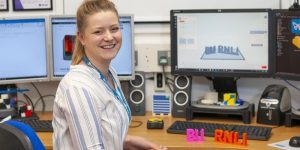
 broad range of knowledge-based interactions between them and the wider world, which result in economic and social benefit to the UK. The current round of funding is referred to as HEIF-6 and runs from August 2017 to July 2022.
broad range of knowledge-based interactions between them and the wider world, which result in economic and social benefit to the UK. The current round of funding is referred to as HEIF-6 and runs from August 2017 to July 2022.
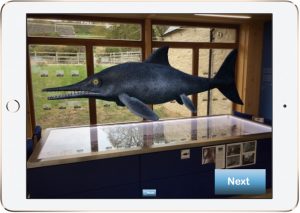


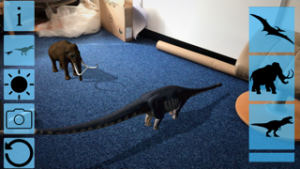 The PalaeoGo! Team is running a major user trial in the autumn of 2018. Over eight weeks this autumn we are seeking your help to both test and develop our ideas. Our aim is to give you access to our test app and with it the resources for you to use with your friends and family. The beasts are coming, and you can join in the fun!
The PalaeoGo! Team is running a major user trial in the autumn of 2018. Over eight weeks this autumn we are seeking your help to both test and develop our ideas. Our aim is to give you access to our test app and with it the resources for you to use with your friends and family. The beasts are coming, and you can join in the fun!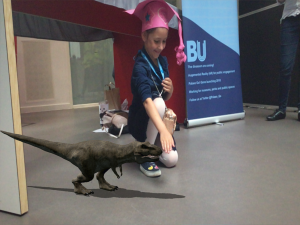 Register by the 21 September 2018 and you will receive the app during the week of the 24 September 2018. We will be on hand during Fresher fair and Induction to sign you up and show you how.
Register by the 21 September 2018 and you will receive the app during the week of the 24 September 2018. We will be on hand during Fresher fair and Induction to sign you up and show you how.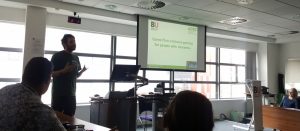
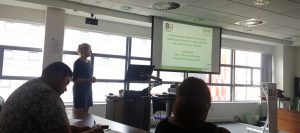

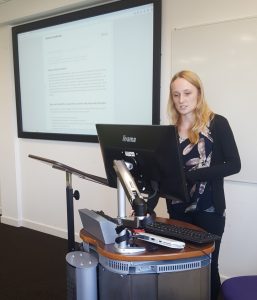

 Recently, I was fortune enough to become the Research Assistant on the HEIF-6 project run by Dr Ben Hicks. This is a one year project that aims to develop and evaluate a free Virtual Learning Environment tool that will support practitioners and care home staff wishing to use commercial gaming technology (iPads, Nintendo Wii) with people with dementia and their care partners. We have a number of experts involved in the research, such as Dr Samuel Nyman from Psychology Department and ADRC, Professor Wen Tang from Department of Creative Technology, Dr Sarah Thomas who is Deputy Director BUCRU and Dr Clare Cutler who is Research Skills and Development Officer. We also collaborate with Alive! who are a charity dedicated to improving the lives of older people and people with dementia through delivering innovative activities (e.g. the use of technology) and training dementia care practitioners. They work with 350 Care Homes and Day Centers across the South West of England and we are lucky to have Malcolm Burgin onboard who as the Regional Manager of Alive!.
Recently, I was fortune enough to become the Research Assistant on the HEIF-6 project run by Dr Ben Hicks. This is a one year project that aims to develop and evaluate a free Virtual Learning Environment tool that will support practitioners and care home staff wishing to use commercial gaming technology (iPads, Nintendo Wii) with people with dementia and their care partners. We have a number of experts involved in the research, such as Dr Samuel Nyman from Psychology Department and ADRC, Professor Wen Tang from Department of Creative Technology, Dr Sarah Thomas who is Deputy Director BUCRU and Dr Clare Cutler who is Research Skills and Development Officer. We also collaborate with Alive! who are a charity dedicated to improving the lives of older people and people with dementia through delivering innovative activities (e.g. the use of technology) and training dementia care practitioners. They work with 350 Care Homes and Day Centers across the South West of England and we are lucky to have Malcolm Burgin onboard who as the Regional Manager of Alive!. 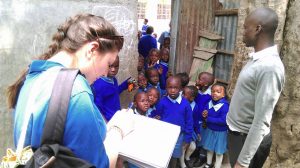
 The deadline is fast approaching for the HEIF-6 funding call – 23rd July.
The deadline is fast approaching for the HEIF-6 funding call – 23rd July.

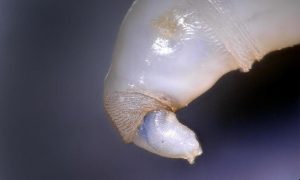











 REF Code of Practice consultation is open!
REF Code of Practice consultation is open! BU Leads AI-Driven Work Package in EU Horizon SUSHEAS Project
BU Leads AI-Driven Work Package in EU Horizon SUSHEAS Project Evidence Synthesis Centre open at Kathmandu University
Evidence Synthesis Centre open at Kathmandu University Expand Your Impact: Collaboration and Networking Workshops for Researchers
Expand Your Impact: Collaboration and Networking Workshops for Researchers ECR Funding Open Call: Research Culture & Community Grant – Apply now
ECR Funding Open Call: Research Culture & Community Grant – Apply now ECR Funding Open Call: Research Culture & Community Grant – Application Deadline Friday 12 December
ECR Funding Open Call: Research Culture & Community Grant – Application Deadline Friday 12 December MSCA Postdoctoral Fellowships 2025 Call
MSCA Postdoctoral Fellowships 2025 Call ERC Advanced Grant 2025 Webinar
ERC Advanced Grant 2025 Webinar Update on UKRO services
Update on UKRO services European research project exploring use of ‘virtual twins’ to better manage metabolic associated fatty liver disease
European research project exploring use of ‘virtual twins’ to better manage metabolic associated fatty liver disease